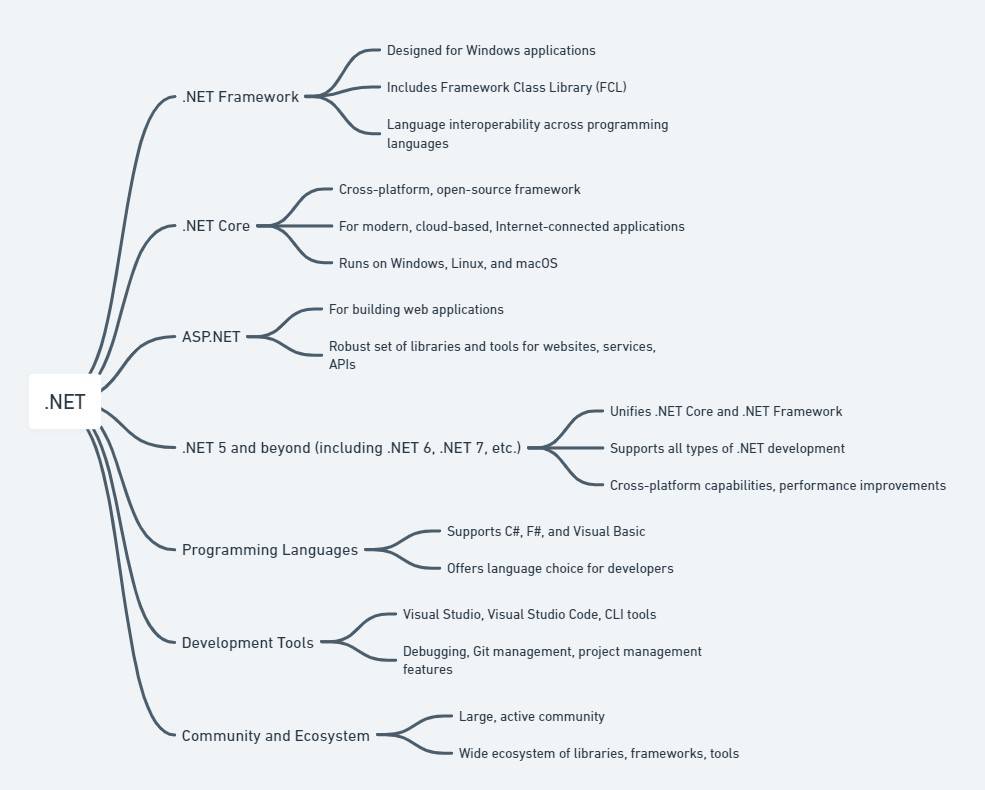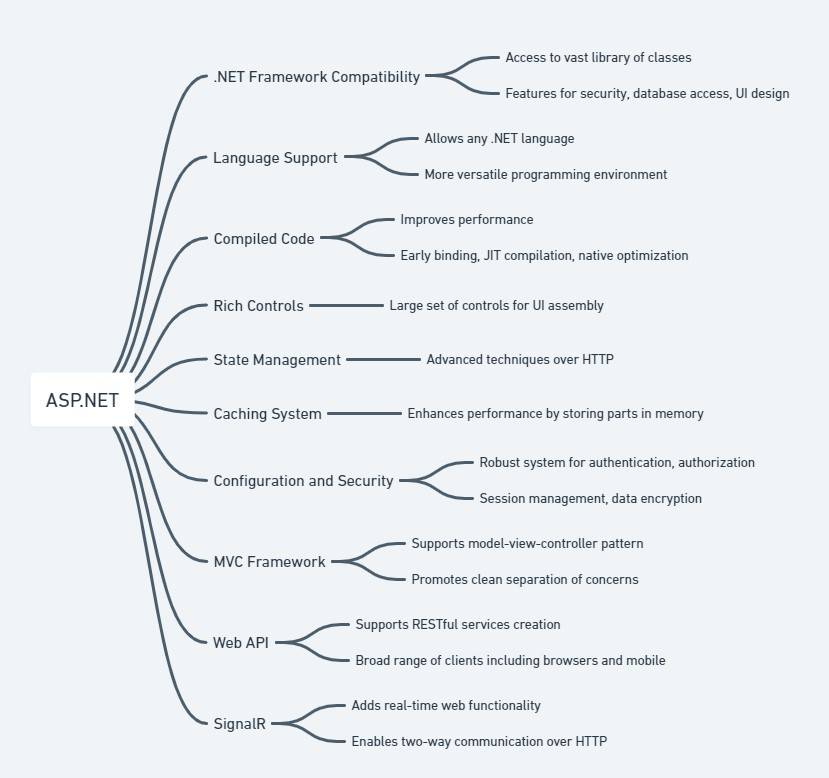Difference Between .NET and ASP.NET
Have you ever wondered about the distinct roles of .NET and ASP.NET in software development? While .NET is a framework for building various applications, ASP.NET specifically targets web application development, offering specialized tools and libraries within the .NET framework. Let's understand more!
Table of Content
- Difference Between .NET and ASP.NET
- What is .NET?
- What is ASP.NET?
- Similarities Between .NET and ASP.NET
Best-suited Web Development courses for you
Learn Web Development with these high-rated online courses
Difference Between .NET and ASP.NET
Below is a table of differences between .NET and ASP.NET
| Feature |
.NET |
ASP.NET |
| Scope |
A comprehensive framework for building various types of applications, including desktop, mobile, web, and cloud-based applications. |
A subset of the .NET framework specifically designed for developing web applications and services. |
| Application Types |
Supports desktop (WinForms, WPF), web (ASP.NET), mobile (Xamarin), cloud (Azure SDK), and more. |
Primarily focused on web applications, including dynamic websites, web APIs, and real-time web functionalities. |
| Languages |
Supports multiple programming languages, including C#, VB.NET, F#, and more, allowing developers to choose the best language for their application. |
While ASP.NET applications are typically written in C# or VB.NET, it inherits the .NET framework's support for multiple languages. |
| Development Tools |
It can be developed using various tools and IDEs, including Visual Studio, Visual Studio Code, and third-party editors. |
Development is primarily done in Visual Studio, which offers specialized tools and templates for ASP.NET projects. |
| Runtime & Libraries |
Utilizes the .NET runtime, which includes a vast library of pre-built classes and routines for various programming needs. |
It utilizes the web-specific parts of the .NET library, including web form controls, MVC patterns, and session management. |
| Execution Model |
The execution model varies based on the application type (e.g., JIT compilation for desktop applications). |
Web applications are compiled into assemblies and run on the .NET runtime, leveraging the ASP.NET model for request handling, middleware, etc. |
| Community & Ecosystem |
Has a broad community and ecosystem encompassing all types of .NET development. |
While it has its own dedicated community, it's part of the larger .NET ecosystem, with a specific focus on web development. |
What is .NET?
.NET (pronounced dot NET) is a free, open-source developer platform created by Microsoft for building many different types of applications. With .NET, developers can use multiple programming languages, editors, and libraries to build for web, mobile, desktop, games, and IoT. Initially released in the early 2000s, .NET has evolved to include a wide range of tools, frameworks, and languages, making it one of the most versatile platforms for developers.
ASP.NET is a web application framework developed by Microsoft to allow programmers to build dynamic websites, applications, and services. It is part of the .NET Framework, enabling developers to use a full-featured programming language such as C#, VB.NET, or F# to build web applications easily. ASP.NET extends the .NET platform with tools and libraries specifically for web development.
Key Features:
Similarities Between .NET and ASP.NET
Below is a table highlighting the similarities between .NET and ASP.NET
| Aspect |
Similarity |
| Platform Foundation |
Both are part of the Microsoft .NET ecosystem, designed to provide a comprehensive development platform. |
| Language Support |
They support multiple programming languages, including C#, VB.NET, and F#; allowing developers to use the same languages across different application types. |
| Development Tools |
Developers can use Visual Studio and Visual Studio Code for both .NET and ASP.NET development, benefiting from features like debugging, IntelliSense, and integrated source control. |
| Libraries and Frameworks |
ASP.NET applications leverage the .NET Standard libraries for common functionalities, ensuring compatibility and code reuse within the .NET ecosystem. |
| Community and Documentation |
Both benefit from a robust community and extensive documentation provided by Microsoft, along with community-driven support and contributions. |
| Runtime and Hosting |
ASP.NET apps run on the .NET runtime, meaning they share the same execution environment and can utilize the same deployment and hosting models, including IIS, Kestrel, and cloud-based services. |
| Security Features |
ASP.NET and .NET applications implement security measures provided by the .NET framework, including authentication, authorization, data protection, and secure coding practices. |
| Performance Optimization |
They share performance optimization features such as JIT compilation, garbage collection, and efficient management of resources, ensuring applications built on either platform are performant. |
Thus, the difference between .NET and ASP.NET primarily lies in their scope and usage within the vast domain of software development.


Check out Web Development courses here!
FAQs
What are the primary differences between .NET and ASP.NET?
.NET is a comprehensive development platform by Microsoft that supports the creation of various types of applications, including desktop, mobile, web, cloud, and IoT applications. It provides a wide range of programming languages, libraries, and tools for developers. ASP.NET, on the other hand, is a part of the .NET platform specifically designed for building web applications and services. It offers web-specific tools, libraries, and runtime support to develop dynamic web pages, RESTful APIs, and real-time web functionalities.
Can I use ASP.NET for non-web applications?
No, ASP.NET is specifically tailored for web development, including websites, web applications, and web services. For non-web applications, such as desktop or mobile applications, other parts of the .NET platform, like .NET Core, .NET Framework, or Xamarin, are more suitable. These provide the necessary tools and libraries for building applications that run on various operating systems and devices.
Is it necessary to learn .NET before starting with ASP.NET?
While it's not strictly necessary to learn the entire .NET platform before starting with ASP.NET, having a basic understanding of .NET concepts can be highly beneficial. ASP.NET is built on top of the .NET platform and leverages its runtime, libraries, and programming languages. Familiarity with .NET fundamentals, such as C# syntax, .NET class libraries, and the common language runtime (CLR), can provide a solid foundation for diving into ASP.NET and making the most of its capabilities for web development.

Hello, world! I'm Esha Gupta, your go-to Technical Content Developer focusing on Java, Data Structures and Algorithms, and Front End Development. Alongside these specialities, I have a zest for immersing myself in v... Read Full Bio




